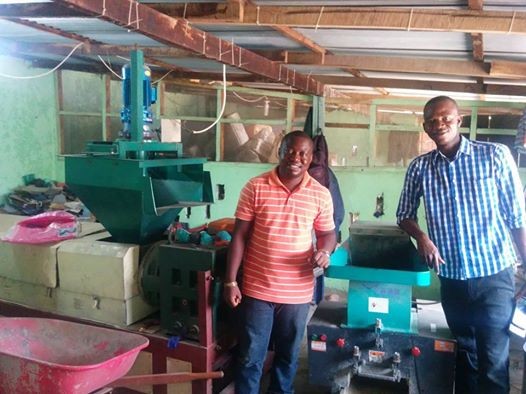
August 2016—Residents of cities and rural areas across Liberia are grappling with the lack of a formal waste collection system after enduring years of civil war and the recent Ebola epidemic. Despite some success in removing and processing waste in the city of Monrovia, waste management remains a problem throughout the country today.
Many civil society organizations and journalists have called for the government to identify new strategies for sustainably collecting and disposing waste.
“We cannot have a nation free from malaria, cholera and diarrheal [disease] if we do not properly manage our waste, through proper recycling,” said James Mulbah, CEO of Green Cities Inc. “And more importantly, if working together as youth, we can tackle the most pressing issues facing our country.”
Mulbah joined forces with Fombah Lasana Kanneh to tackle Liberia’s crippling waste management issue by launching a joint venture, the Urban Youth Recycling Project. Kanneh works with Gift2Change to build the capacity of youth in slums.
Since the project’s launch in 2014, Mulbah and Kanneh have successfully scaled their activities to five slum communities (West Point, Doe Community, Slipway, Redligh and New Kru Town). Kanneh’s organization, Gift2Change, works with Liberian youth to collect recyclable waste material, which is then transported and recycled at the Green Center, Liberia’s first waste segregation and recycling center, under Mulbah’s Green Cities.
Income generated by the joint venture is then distributed evenly and, thus far, the endeavor has employed over 150 youth.
“The best way to solve Africa’s problems is to engage in creative and innovative activities, and the continent will be a better place when young people can work together in achieving their dreams,” says Mulbah.
His friendship with Kanneh, whom he met in 2014 at a U.S. Embassy event in Monrovia, is a good illustration of the power of collaboration.
Mulbah, an alumni of the Mandela Washington Fellowship, the flagship program of President Barack Obama’s Young African Leaders Initiative, encouraged Kanneh to apply to the 2015 cohort, and guided him through the application process. Kannah took Mulbah's advice and was accepted into the Fellowship.
Mulbah encouraged Kanneh to take his leadership skills even farther by running for, and winning, a position on the fellow-driven Regional Advisory Board for West Africa. Mulbah held a position on the Board in 2014 and had experienced the benefits of connecting with young people across the region to collaborate on common challenges.
Through the USAID-supported Regional Advisory Boards, fellows continue their leadership and professional development when they return to Africa by reaching across borders to foster collaboration across the continent and across cohorts.
By combining their skills and resources, Mulbah and Kanneh are not only helping to improve their country’s waste disposal difficulties, but they are encouraging other young people to work together for the common good and a greener future for the continent.
LINKS
Follow @USAIDLiberia, on Facebook, on Flickr, on YouTube







Comment
Make a general inquiry or suggest an improvement.